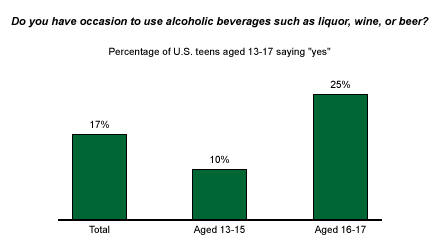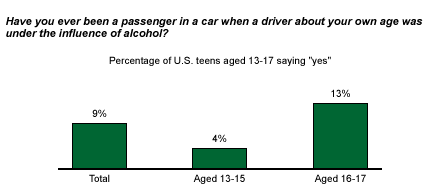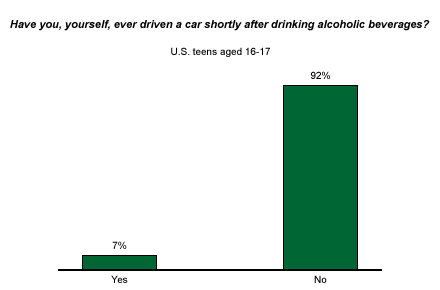More often than not, teenagers' decisions about what to wear and listen to, or even whom to associate with, are influenced by what their friends are doing. Peer pressure takes its ugliest form when it encourages participation in dangerous or illegal activities such as drinking or driving drunk.
A new Gallup Youth Survey* asked teens a series of questions about alcohol use and drunk driving. The survey asked teens, aged 13 to 17, if they have occasion to use alcoholic beverages such as liquor, wine, or beer. Although none of them can legally purchase alcoholic drinks, about one in six (17%) say they use them.

Older teens are more likely than younger teens to say they drink. A quarter of 16- and 17-year-olds say they drink. Among 13- to 15-year-olds, only 1 in 10 admit drinking. The legal drinking age in the United States is 21. So it's possible that drinking could be underreported among teens out of fear of disclosing illegal activity.
Teens, Alcohol, and Cars
Teens can be dangerous drivers, either from a lack of maturity or experience (see "Public: Sixteen Too Young to Drive" in Related Items) -- and adding alcohol to the equation is lethal. According to the National Highway Traffic Safety Administration, the percentage of non-alcohol-related fatalities involving teen drivers was 74.7% in 2003, and the percentage of alcohol-related fatalities involving teen drivers was 25.3%.
Data from the Gallup Youth Survey suggest that a non-trivial number of teens have experienced impaired driving firsthand. Nine percent of teens report having been a passenger in a car driven by someone about their age who was under the influence of alcohol. Not surprisingly, this percentage increases among teens of legal driving age. Four percent of 13- to 15-year-olds say they have ridden with a teen driver under the influence, compared with 13% of 16- and 17-year-olds.

A small but not insignificant number of teens report having driven a car shortly after drinking alcohol. Seven percent of 16- and 17-year-olds say they have. Obviously, 13- to 15-year-olds aren't of legal driving age and therefore don't report driving after drinking. Again, social desirability and legal factors could affect the way teens respond this question, so the actual percentage of teens who have driven after drinking could be higher.

*These results are based on telephone interviews with a randomly selected national sample of 1,028 teenagers in the Gallup Poll Panel of households, aged 13 to 17, conducted Jan. 17 to Feb. 6, 2005. For results based on this sample, one can say with 95% confidence that the maximum error attributable to sampling and other random effects is ±3 percentage points. In addition to sampling error, question wording and practical difficulties in conducting surveys can introduce error or bias into the findings of public opinion polls.